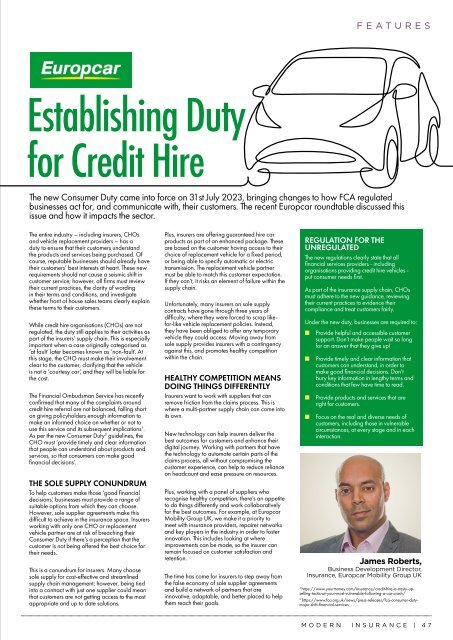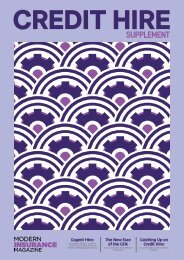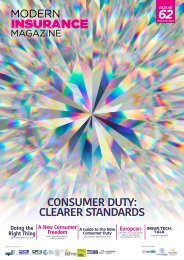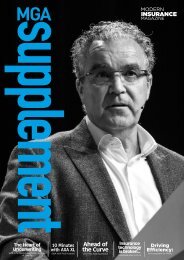Modern Insurance Magazine Issue 61
You also want an ePaper? Increase the reach of your titles
YUMPU automatically turns print PDFs into web optimized ePapers that Google loves.
FEATURES<br />
Establishing Duty<br />
for Credit Hire<br />
The new Consumer Duty came into force on 31st July 2023, bringing changes to how FCA regulated<br />
businesses act for, and communicate with, their customers. The recent Europcar roundtable discussed this<br />
issue and how it impacts the sector.<br />
The entire industry – including insurers, CHOs<br />
and vehicle replacement providers – has a<br />
duty to ensure that their customers understand<br />
the products and services being purchased. Of<br />
course, reputable businesses should already have<br />
their customers’ best interests at heart. These new<br />
requirements should not cause a seismic shift in<br />
customer service; however, all firms must review<br />
their current practices, the clarity of wording<br />
in their terms and conditions, and investigate<br />
whether front of house sales teams clearly explain<br />
these terms to their customers.<br />
While credit hire organisations (CHOs) are not<br />
regulated, the duty still applies to their activities as<br />
part of the insurers’ supply chain. This is especially<br />
important when a case originally categorised as<br />
‘at fault’ later becomes known as ‘non-fault’. At<br />
this stage, the CHO must make their involvement<br />
clear to the customer, clarifying that the vehicle<br />
is not a ‘courtesy car’, and they will be liable for<br />
the cost.<br />
The Financial Ombudsman Service has recently<br />
confirmed that many of the complaints around<br />
credit hire referral are not balanced, falling short<br />
on giving policyholders enough information to<br />
make an informed choice on whether or not to<br />
use this service and its subsequent implications 1 .<br />
As per the new Consumer Duty 2 guidelines, the<br />
CHO must ‘provide timely and clear information<br />
that people can understand about products and<br />
services, so that consumers can make good<br />
financial decisions’.<br />
THE SOLE SUPPLY CONUNDRUM<br />
To help customers make those ‘good financial<br />
decisions’, businesses must provide a range of<br />
suitable options from which they can choose.<br />
However, sole supplier agreements make this<br />
difficult to achieve in the insurance space. Insurers<br />
working with only one CHO or replacement<br />
vehicle partner are at risk of breaching their<br />
Consumer Duty if there’s a perception that the<br />
customer is not being offered the best choice for<br />
their needs.<br />
This is a conundrum for insurers. Many choose<br />
sole supply for cost-effective and streamlined<br />
supply chain management; however, being tied<br />
into a contract with just one supplier could mean<br />
that customers are not getting access to the most<br />
appropriate and up to date solutions.<br />
Plus, insurers are offering guaranteed hire car<br />
products as part of an enhanced package. These<br />
are based on the customer having access to their<br />
choice of replacement vehicle for a fixed period,<br />
or being able to specify automatic or electric<br />
transmission. The replacement vehicle partner<br />
must be able to match this customer expectation.<br />
If they can’t, it risks an element of failure within the<br />
supply chain.<br />
Unfortunately, many insurers on sole supply<br />
contracts have gone through three years of<br />
difficulty, where they were forced to scrap likefor-like<br />
vehicle replacement policies. Instead,<br />
they have been obliged to offer any temporary<br />
vehicle they could access. Moving away from<br />
sole supply provides insurers with a contingency<br />
against this, and promotes healthy competition<br />
within the chain.<br />
HEALTHY COMPETITION MEANS<br />
DOING THINGS DIFFERENTLY<br />
Insurers want to work with suppliers that can<br />
remove friction from the claims process. This is<br />
where a multi-partner supply chain can come into<br />
its own.<br />
New technology can help insurers deliver the<br />
best outcomes for customers and enhance their<br />
digital journey. Working with partners that have<br />
the technology to automate certain parts of the<br />
claims process, all without compromising the<br />
customer experience, can help to reduce reliance<br />
on headcount and ease pressure on resources.<br />
Plus, working with a panel of suppliers who<br />
recognise healthy competition, there’s an appetite<br />
to do things differently and work collaboratively<br />
for the best outcomes. For example, at Europcar<br />
Mobility Group UK, we make it a priority to<br />
meet with insurance providers, repairer networks<br />
and key players in the industry in order to foster<br />
innovation. This includes looking at where<br />
improvements can be made, so the insurer can<br />
remain focused on customer satisfaction and<br />
retention.<br />
The time has come for insurers to step away from<br />
the false economy of sole supplier agreements<br />
and build a network of partners that are<br />
innovative, adaptable, and better placed to help<br />
them reach their goals.<br />
REGULATION FOR THE<br />
UNREGULATED<br />
The new regulations clearly state that all<br />
financial services providers - including<br />
organisations providing credit hire vehicles -<br />
put consumer needs first.<br />
As part of the insurance supply chain, CHOs<br />
must adhere to the new guidance, reviewing<br />
their current practices to evidence their<br />
compliance and treat customers fairly.<br />
Under the new duty, businesses are required to:<br />
n Provide helpful and accessible customer<br />
support. Don’t make people wait so long<br />
for an answer that they give up!<br />
n Provide timely and clear information that<br />
customers can understand, in order to<br />
make good financial decisions. Don’t<br />
bury key information in lengthy terms and<br />
conditions that few have time to read.<br />
n Provide products and services that are<br />
right for customers.<br />
n Focus on the real and diverse needs of<br />
customers, including those in vulnerable<br />
circumstances, at every stage and in each<br />
interaction.<br />
James Roberts,<br />
Business Development Director,<br />
<strong>Insurance</strong>, Europcar Mobility Group UK<br />
1<br />
https://www.yourmoney.com/insurance/credit-hire-a-nasty-upselling-tactic-at-your-most-vulnerable-following-a-car-crash/<br />
2<br />
https://www.fca.org.uk/news/press-releases/fca-consumer-dutymajor-shift-financial-services<br />
MODERN INSURANCE | 47
















